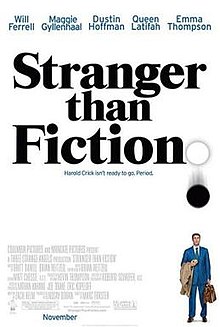Stranger than Fiction (2006 film)
| Stranger than Fiction | |
|---|---|

Theatrical film poster
|
|
| Directed by | Marc Forster |
| Produced by | Lindsay Doran |
| Written by | Zach Helm |
| Starring | |
| Music by | |
| Cinematography | Roberto Schaefer |
| Edited by | Matt Chesse |
|
Production
companies |
|
| Distributed by | Columbia Pictures |
|
Release date
|
|
|
Running time
|
113 minutes |
| Country | United States |
| Language | English |
| Budget | $30 million |
| Box office | $53.7 million |
Stranger than Fiction is a 2006 American fantasy comedy-drama film directed by Marc Forster, produced by Lindsay Doran, and written by Zach Helm. The film stars Will Ferrell, Maggie Gyllenhaal, Dustin Hoffman, Queen Latifah, and Emma Thompson. The main plot follows Harold Crick (portrayed by Ferrell), a nondescript white-collar worker who begins hearing a disembodied voice narrating his life as it happens – seemingly the text of a novel in which it is stated that he will soon die – and he frantically seeks to somehow prevent that ending. The film was shot on location in Chicago, and has been praised for its innovative, intelligent story and fine performances. Ferrell, who came to prominence playing brash comedic parts, garnered particular attention for offering a restrained performance in his first starring dramatic role.
Harold Crick, an agent for the Internal Revenue Service, lives his life by his wristwatch. He is assigned to audit an intentionally tax-delinquent baker, Ana Pascal, to whom he is attracted. On the same day, he begins hearing the voice of a woman omnisciently narrating his life but is unable to communicate with it. Harold's watch stops working and he resets it using the time given by a bystander; the voice narrates, "little did he know that this simple, seemingly innocuous act would result in his imminent death". Worried by this prediction, Harold consults a psychiatrist who attributes the voice to schizophrenia, though they consider that if there really is a narrator, he should visit an expert in literature. Crick visits Jules Hilbert, a literature professor, and relates his story. When Jules recognizes aspects of a literary work in Harold's story, he encourages Harold to identify the author, first by determining if the work is a comedy or tragedy.
...
Wikipedia
